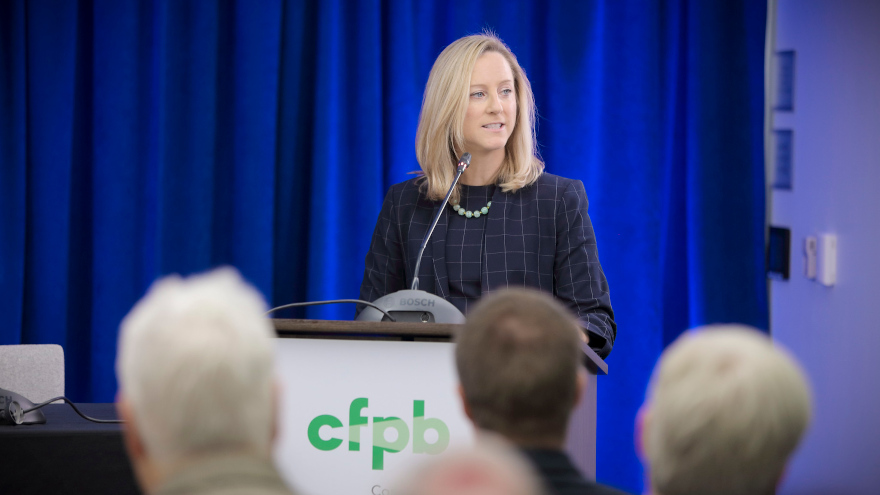Kraninger highlights accomplishments during first year leading CPFB

This week, Consumer Financial Protection Bureau director Kathleen Kraninger celebrated her one-year anniversary leading the regulator. Photo courtesy of the CFPB.
By subscribing, you agree to receive communications from Auto Remarketing and our partners in accordance with our Privacy Policy. We may share your information with select partners and sponsors who may contact you about their products and services. You may unsubscribe at any time.
WASHINGTON, D.C. –
This week, Consumer Financial Protection Bureau director Kathleen Kraninger celebrated her one-year anniversary leading the regulator.
Kraninger highlighted through a news release that during her first year she met with more than 800 consumers, consumer groups, state and local government officials, military personnel, financial institutions, academics, non-profits and former and current bureau advisers and traveled to 17 states.
“It is an honor and privilege to serve and protect American consumers,” Kraninger said in the news release. “In this last year, we’ve greatly enhanced consumer protection by harnessing the resources provided by Congress to be more effective and comprehensively utilized.
“I commend the bureau employees who work tirelessly to achieve our mission,” she continued. “We will continue to use all of our tools to not only go after bad actors that break the law, but also to prevent harm in the first place by building a culture of compliance throughout the financial system. This culture of compliance can only be built by having smart and clear rules of the road as well as a robust supervisory examination process. I look forward to our continued work in the next four years on behalf of American consumers.”
Kraninger also marked her anniversary by making a public appearance and sharing remarks during the National Association of Attorneys General Capital Forum. She not only reiterated her attempts to reach out to various segments of financial services, but she also revisited a development that surfaced back in September.
The bureau, working in partnership with multiple state regulators, previously launched the American Consumer Financial Innovation Network (ACFIN). It’s an organization that officials explained is designed to enhance coordination among federal and state regulators to facilitate financial innovation.
Subscribe to Auto Remarketing to stay informed and stay ahead.
By subscribing, you agree to receive communications from Auto Remarketing and our partners in accordance with our Privacy Policy. We may share your information with select partners and sponsors who may contact you about their products and services. You may unsubscribe at any time.
The CFPB said it invited all state regulators to join ACFIN, and the initial members of ACFIN are the attorneys general of:
— Alabama
— Arizona
— Georgia
— Indiana
— South Carolina
— Tennessee
— Utah
“ACFIN allows federal and state officials to coordinate efforts to facilitate innovation and further shared objectives such as consumer protection and access, competition and financial inclusion, and it also provides a platform for our federal and state partners to coordinate as they develop new rules of the road and apply existing ones,” Kraninger said this week.
“This coordination also promotes regulatory certainty for innovators, which will benefit consumers and the economy alike. The network also seeks to keep pace with market innovations and help ensure they are free from fraud, discrimination and deceptive practices,” she went on to say.
Kraninger also used her speech to the attorneys general to touch on a topic probably most important to dealerships and finance companies.
“One of the bureau’s critical tools is rulemaking and guidance where appropriate — articulating clear rules of the road for regulated entities that promote competition, increase transparency and preserve fair markets for financial products and services,” she said. “Where Congress directs the CFPB to promulgate rules or address specific issues through rulemaking, we will comply with the law.
“Where the bureau has discretion, we will focus on preventing consumer harm by maximizing informed consumer choice and prohibiting acts or practices which undermine the ability of consumers to choose the products and services that are best for them,” Kraninger continued.
“To develop the best possible rules, the CFPB must use the best possible process. Because rules are general standards, they are not best articulated on a case-by-case basis through enforcement actions,” she went on to say.
“Rather, they should be developed through a rulemaking process that is transparent; that allows stakeholders to submit comments; that allows partners to weigh in; that reflects rigorous economic and market analysis; and that provides for judicial review. Under my leadership, the CFPB will proceed deliberately and transparently in its rulemakings,” Kraninger added.


